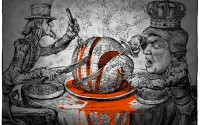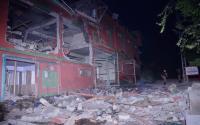Peter Hansen, the commissioner-general of the UN Relief and Works Agency in the territories, is being persecuted for having spoken the truth: Members of Hamas work in UNRWA. The Canadian Foreign Affairs Department is concerned and the Israeli Foreign Ministry is upset over the "revelation." Two days after the broadcast of aerial photos that allegedly show, according to Israel, Palestinians loading a Qassam rocket into a UNRWA ambulance, Hansen's words could strengthen Israeli accusations that "UNRWA is collaborating with terrorists."But the Israeli assault on UNRWA could turn out to be a double-edged sword, if it leads to a cutback in the donations upon which the organization's budget depends. Because UNRWA is one of the most important safety nets the international community has spread out under Israel, which, as an occupying power, has been unwilling to recognize its responsibility for the occupied civilian population. For the past three years, the UN has been regularly providing food aid to about half the Palestinian population, which is in a state of "food insecurity." UNRWA alone provides regular food aid to about 1.5 million Palestinians in the West Bank and Gaza Strip.World Bank studies show that the direct reason for the collapse of the Palestinian economy and the scope of Palestinian poverty is the Israeli policy of putting drastic restrictions on movement within the territories. The UN food aid is preventing outbreaks of disease and the spread of malnutrition. How would Israel's UN ambassador, who is calling for Hansen's removal, respond to reports of malnutrition of an African-type scale, if not outright hunger, in the territories that Israel controls?UNRWA is currently the body most concerned with finding new housing for thousands of refugees made homeless by Israel's home demolitions in the Gaza Strip. In these very days, when Israel Defense Forces bulldozers are causing people to flee their homes in the Jabalya refugee camp, UNRWA - along with the relatives of those affected - is mobilizing to provide initial aid in the form of food, textbooks, kitchen appliances and medicines - everything that was lost to the teeth of the Israeli machinery. After that, it will also supervise and coordinate the rebuilding of the houses. Just as it is doing in Jenin, Rafah and Khan Yunis, and thereby preventing a deepening of the Palestinian social crisis, as well as sparing Israel from having to give an accounting under international law for the harm done to the civilian population under its occupation.Palestinian Muslim society, especially in Gaza, is becoming increasingly devout as earthly life becomes tougher and tougher, and secular and nationalistic political solutions fail. One manifestation of this is the growing support for Hamas as a religious-national movement whose leaders have proven - in the eyes of many Palestinians - to be more fair and caring than the leaders of Fatah and the Palestinian Authority. Not all Hamas supporters believe in the movement's messianic-political platform of a "Greater Muslim Palestine." Most Hamas supporters are not involved in the activities of the movement's military wing. Various surveys show support for Hamas in Gaza ranging from 25 to 40 percent of the population. Many of these supporters are teachers, nurses and doctors. It's only natural that some would look for and find work with UNRWA, the second-largest employer after the PA. If the Canadian Foreign Affairs Department wishes to understand the phenomenon, it ought to consult sociologists and historians of occupying, colonial regimes rather than rely on superficial intelligence reports.And as for the question of the Qassam or the stretcher: One hopes that the UN team that looks into the Israeli accusations will get to the real truth of the matter. Perhaps it also ought to have a talk with Zohar Shapira, a sergeant major in the reserves who is in the elite Sayeret Matkal unit. He participated in Operation Defensive Shield in April 2002 and was astounded to discover that the IDF was using military ambulances to surreptitiously transport troops on their way to apprehend suspects in Yazid, north of Nablus. His commanders told him that this was a war and that ambulances were the most protected vehicles at their disposal. The UN committee would hear Shapira complain about the misuse of ambulances - by both sides, but as an Israeli he is also upset about the hypocrisy of the IDF and government spokespeople. An IDF spokesman promised the Maariv reporter who published Shapira's testimony in June that, in the wake of a few complaints, "procedures have been sharpened." Okay, but Shapira and the Palestinians have no military drones with which to ascertain whether the new procedures are being implemented. But, even if it is proven that it was a Qassam, just as the IDF should not be subjected to a sweeping accusation, neither should UNRWA. Only someone who does not want to recognize the commitment of UNRWA employees to the society in which they live could rush to tarnish the entire organization with the charge of "collaboration with terrorists."Evidently, neither Hansen nor UNRWA are the real target of the Israeli diplomatic assault, but rather the UN and any other institution that dares to overstep the boundaries set by the U.S. State Department spokesman in criticizing Israel's policies.
Canlı Yayın
Açık Gazete'nin yıl boyunca sunduğu haberlerden öne çıkan derlemeler
Kâinatın tüm seslerine, renklerine, titreşimlerine Açık Radyo...
İletişim
Açık Medya Yayıncılık A.Ş.
Koltukçular Çıkmazı No 7 İç Kapı No 2
Tophane, Beyoğlu, İstanbul, TR-34425
Telefon: +90 212 343 4040
Faks: +90 212 232 3219
E-posta: [email protected]






